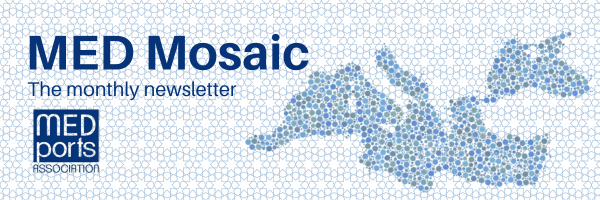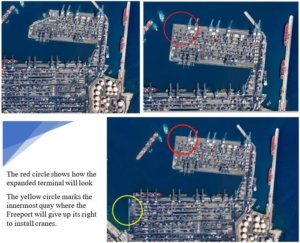MED MOSAIC

Issue 11
HOT SEAT:
Interview with David Magro – CEO of Malta Freeport Corportation
The Future of Malta Freeport and Its Community Initiatives
- In the context of Malta Freeport’s location within the city, what are the primary challenges that Malta Freeport faces in its relationship with the local community?
Basically, the challenges that Malta freeport faces are mainly:
- Noise being generated by the vessels that berth along the Terminals,
- The noise generated by handling of containers and stevedores,
- Emissions generated by Vessels during their 30 hours stay,
- Adour’s that come out from Bunkering fuel tanks,
- The Squaring off project of Terminal two.
Malta Freeport is just a few meters away from the village of Birzebbuga. Challenges to mitigate and maintain harmony/balance is constant. The Authority must act as a regulator and watchdog to see that relationships between the main operators of the Freeport are healthy. During the past 6 years the Corporation has issued two Double glazing schemes for the residents of the village These schemes amounted to Eur750k and were taken up in a short period. These schemes were issued to minimize the noise being generated by vessels berthed along the terminals.
MFC and MFTL are represented in the Environmental Monitoring Committee. This committee has also representatives from Transport Malta, ERA, Birzebbuga Local council, and other NGO’s coming from the village. On a monthly basis, this committee meet to discuss complaints raised by the local community, the operator keeps all represented parties updated on projects that will affect the locality.
Part of the contractual obligation oblige the main operator to allocate a sum on a yearly basis which is the distributed to the local community after consultation with Malta Freeport Corporation. This pot is administered between the operator and the Authority and is fairly distributed between Local Council, sports associations and NGO’s of locality of Birzebbuga.
To minimize noise and emissions, MFC has ventured for the Onshore Power Supply Project. Works on the OPS tender are underway. This project is being Co-funded by the EU under the “Just Transition Fund”. This project will see the installations of points on the North Quays of Terminal 1 & 2 so that Containers vessels would be able to plug with the National Grid once they berth. According to the CBA conducted by MFC, by means of the OPS, about 4k metric tones of CO2 dust would be eliminated from air. This project will cost about Eur12.5m and it is expected that by end of this year it will be commissioned for testing.
Last year an agreement was reached between MFC and MFTL so that Terminal 2 could be squared off. This would see land reclamation adjacent to Terminal 2 so that vessels over 400 meters could berth. In return following discussions between GoM, MFC and MFTL it was agreed that the cost of this project amounting to Eur55m would be shared between them. Moreover, as a goodwill, the operator renounced the option to install Quay Cranes on South Quay of Terminal 1 which is meters away from the residents of the village. The Operator also agreed that works along the South Quay of terminals 1 would be done between 6:00 and 22:00 thus residents would not be affected during the night by noise being generated from this area.
Last February Malta Freeport Corporation donated a new constructed Multi Story car part to the Local Council and main operator. A total of 450 car spaces were created. MFC funded the project, which cost amounted to Eur3m and once it was completed a three-party agreement was concluded so that the Local Council and MFTL would administer and manage the car park. The residents of the community will be entitled to certain benefits when using this car park. One can state that this is the largest ever CSR project done in the Island.
- Can you explain how the Red Sea crisis and the implementation of new Emissions Trading System (ETS) directive are affecting Malta Freeport?
The impact of the Red Sea crisis left its mark on the operations within the Freeport. Delays were witnessed and the operator noticed shifting of schedules to other Med ports. Up to end march, six Malta-flagged ships were subject of attacks in the wider region, including a result of piracy which has increased because of the instability. Malta welcomed the swift launch of EUNAVFOR SPIDES with a mandate to protect commercial shipping transiting through the Red Sea.
The Operator has made a study and certain moves by Shipping lines are being noticed. Such moves are being made to Mediterranean ports that do not fall under the ETS directive. As for the ETS, as Authority, we are in favour of the Climate regulations being adopted, however equal playing grounds should be maintained for all Mediterranean ports. In view of the thresholds set by the Commission in identifying neighbouring ports (the share of transhipment of containers exceeding 65% of the total container traffic), the same criteria could be utilised for the exclusion of EU transhipment hubs from the application of ETS. Therefore, EU transhipment hubs with a share of transhipment exceeding 65% of the total traffic would be excluded from applying the provisions of ETS. As Authority we believe that common sense will prevail at the end.
- With the MEDPorts forum around the corner, what are your expectations from the event and how do you envision it contributing to port development in the Mediterranean region?
We would like to welcome all participants to our Island. Winston Churchill used to refer to Malta as the “Aircraft Carrier” in the centre of the Mediterranean during the second world war. Nowadays, Malta has adopted an economy based on Services and the Freeport falls under this category. My expectation is to market our Freeport and the ongoing projects being implemented. During 2023 Malta Freeport Terminals saw a turnover of over 2.8 TEU’s, a total of 1900 container vessels that called in, a throughput of 1,946,340 metric tons of fuel/oil from EVOS Malta Ltd. In 2023 Lloyds list Malta Freeport is placed as the 73 busiest ports in the world and the 11 in Europe. The Operator offers 33 Service Calling at Malta. Our Freeport contributes 2.5 to the GDP of Malta. It contributes as a HUB to port development in the Med region.
Shipments from Asia makes their first stop at Freeport and feeder vessels distribute to various Mediterranean ports. We hope that the event of Medports being held in Malta leads to sharing of best practice and enhance work (such in the case of the ETS).
- With MEDPorts having several members that are located on Islands such as yours, what do you consider to be the challenges of being an island port, and how does Malta Freeport address these challenges to maintain competitiveness and operational efficiency within the global maritime industry?
The Shipping Market is a continuous changing market. The challenge of the Pandemic was a case in point. Being an Island, the only source of connectivity was through Sea since the airport closed for more then a year. Malta Freeport raised to the occasion and after a month closure the recovery was instant and the Island was 100% dependent on the ports of Malta, mainly the Freeport and Valletta Grand Harbour. Apart for the local economy, Malta Freeport also contributed as a HUB for other ports from Europe, American continents, Maghreb countries and Asia as well. The fact that we are an Island is a disadvantage because there is no land connectivity which would enable us to transport via hinterland to other countries, however the Freeport has a strategic position in the centre of the Mediterranean Sea. Malta has maximised this potential since the colonization by the Phoenicians.
The Operator has a solid structure, and their IT system is efficient. The JIT concept is renowned to be a pivotal plus for MFTL. The waiting time is very low and planning of quay occupancy is well planned. MFTL stands in the 11th place in Europe and 73rd amongst the top 100 ports worldwide as per 2023 results. I am quoting the “Top 100 Container Ports” published by Lloyds List.
As for connectivity, Malta Freeport offers regular connections with over 100 ports worldwide around 50 of which are in the Mediterranean. This has been recognised through the UNCTAD Annual Statistics on the Global Liner Shipping Network as measured by the Liner Shipping Connectivity Index (LCSI).
Based on the UNCTAD study for 2023, Malta Freeport ranked in the 36th place amongst 1,328 ports worldwide.





